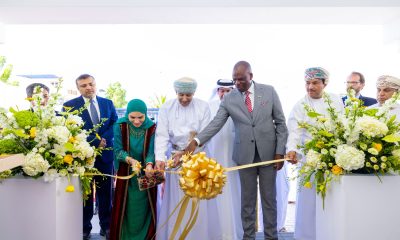Economy
Time to Buy Saudi Stocks? Some Investors Look at Dubai Instead

Saudi Arabian stocks are about to join major emerging-markets benchmarks, gaining the attention of many money managers for the first time. But some investors familiar with markets in the Gulf say that Dubai offers bigger potential gains.
That’s because the biggest stocks in Riyadh have been rallying in anticipation of their inclusion in the gauges, compiled by FTSE Russell and MSCI Inc., in several tranches starting this month. Dubai’s market, on the other hand, has been battered in the past year by concerns mostly tied to its real estate market, a pillar of its economy.
Saudi shares have historically traded at a premium to Dubai’s, in terms of estimated price-to-earnings. But the gap between them reached the widest since 2010 in February. The Dubai Financial Market General Index was the worst-performer globally last year among major gauges tracked by Bloomberg, while the Saudi peer was among the 10 best.
“We think the U.A.E. has reached the bottom of its real estate cycle,” said James Johnstone, the London-based co-head of emerging and frontier markets at RWC Partners LLC, which oversees $15 billion. “We have been using that opportunity to reduce some of our Saudi holdings and reallocate it back into the U.A.E. property stocks that are very cheap and attractively priced.”

More from RWC’s Johnstone:
“We still like Saudi Arabia, but we think valuations are not cheap and some of the stocks reached full price. We saw a big rally in banks and petrochemicals.” He holds Emaar Development PJSC, which has “strong, double-digit cash flow yield.” “Dubai is in a very interesting part of the world in terms of being a hub for the companies’ continuing their expansion into the Middle Eastern and African markets.” Considers that “the story of Dubai both as a hub for businesses and a tourist destination looks to be very strong,” expects property stocks to generate around 14 percent dividend yields this year.
Read more: Dubai Property Giant’s Fabulous February Triggers Sentiment Test
Thea Jamison, a portfolio manager at Change Global Investment LLC:
“Saudi Arabia’s stock market is expensive,” she said, adding that fundamentals including return on equity and operating margin are “not attractive” versus Dubai. The reason for the Saudi premium is “investor optimism” on inflows due to the MSCI inclusion; “we have a more cautious stance.” “When I visited Saudi Arabia several months ago, I gathered the economy was under pressure. Oil revenues are subdued, limiting government spending. The private sector is tackling the structural labor issues.” Adds that plans by the government to open up the economy will bring more competition and further pressure profitability for Saudi companies.
Morgan Stanley analysts Marina Zavolock, Regiane Yamanari and Katherine Carpenter:
They recommended a double-upgrade on U.A.E. equities to overweight in a report in February, citing “signs of potential potential fundamental improvement in the property sector and continued strength in financials.” Analysts estimate that global emerging markets funds have a neutral position on the U.A.E., “but we think that, as Saudi’s MSCI EM inclusion approaches, U.A.E. may shift from a funding source to a cheaper alternative for investors wishing to cover significant Middle East and North Africa equities underweights.” They cited that Emaar Properties’ PJSC fourth quarter results were “meaningfully better-than-expected, driven by a big beat at Emaar Development, “an early sign of potential fundamental improvement.”
-

 Banking & Finance1 month ago
Banking & Finance1 month agoOman Oil Marketing Company Concludes Its Annual Health, Safety, Environment, and Quality Week, Reaffirming People and Safety as a Top Priority
-

 News2 months ago
News2 months agoOIG Appoints New CEO to Lead Its Next Chapter of Excellence
-

 News2 months ago
News2 months agoReport: How India & The Middle East Are Exploiting Immense Economic Synergies
-

 Uncategorized2 months ago
Uncategorized2 months agoOman’s ISWK Cambridge Learners Achieve ‘Top in the World’ and National Honours in June 2025 Cambridge Series
-

 Trade2 months ago
Trade2 months agoConsulate Office of the Republic of South Africa opens in Muscat, enhancing bilateral relations
-

 Economy1 month ago
Economy1 month agoPrime Minister of India Narendra Modi to Visit the Sultanate of Oman on 17-18 December
-

 News1 month ago
News1 month agoJamal Ahmed Al Harthy Honoured as ‘Pioneer in Youth Empowerment through Education and Sport’ at CSR Summit & Awards 2025
-

 News1 month ago
News1 month agoIHE Launches Eicher Pro League of Trucks & Buses in Oman




























You must be logged in to post a comment Login